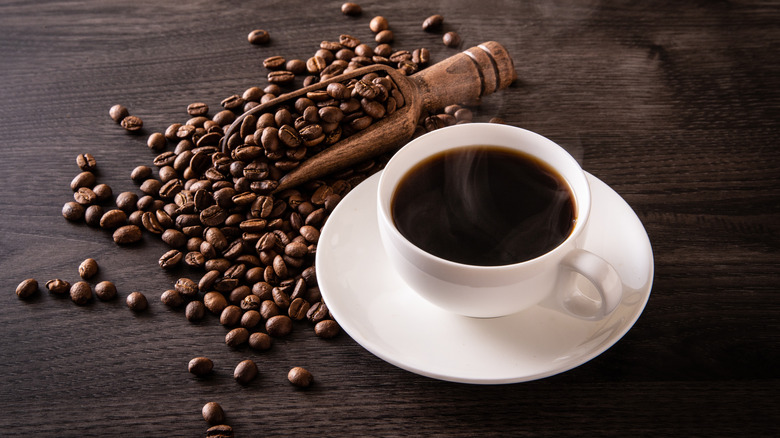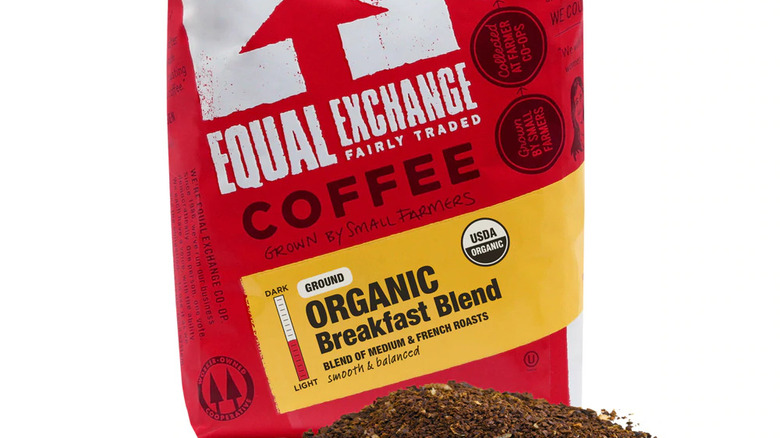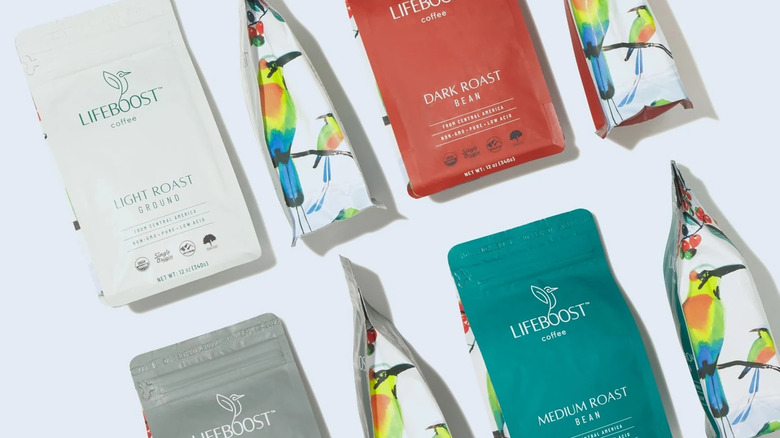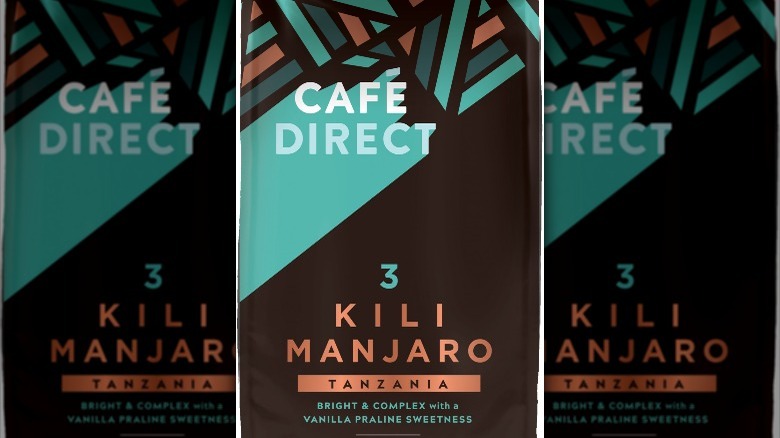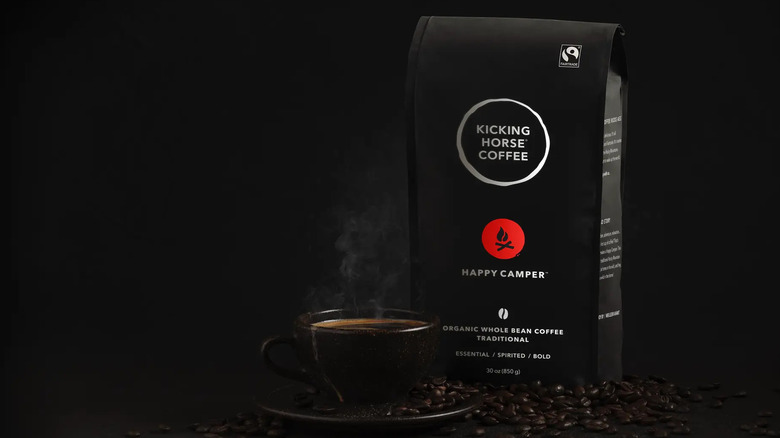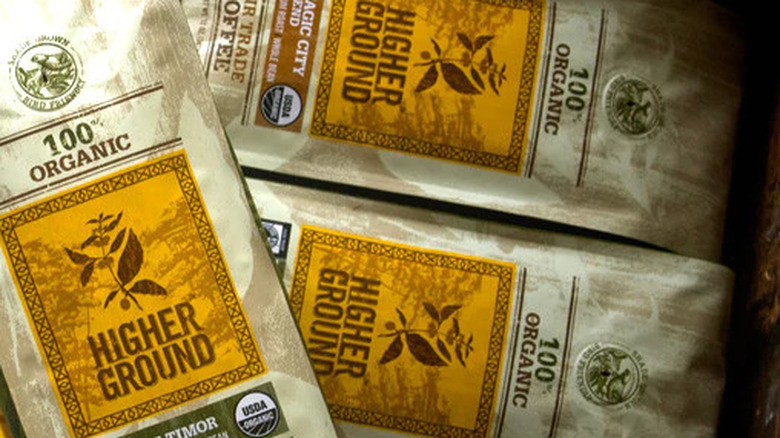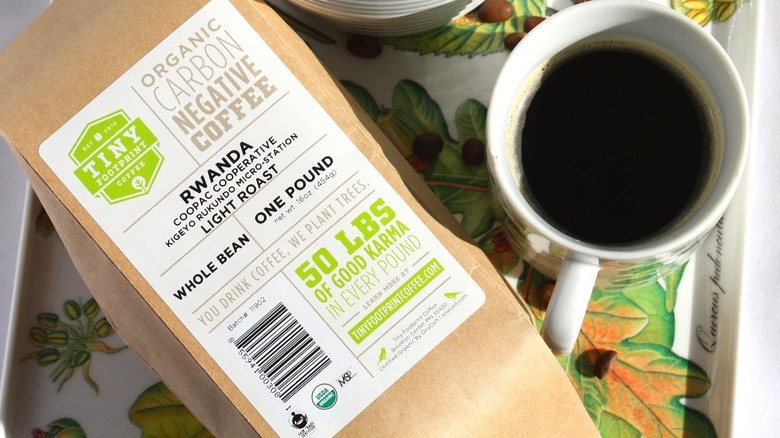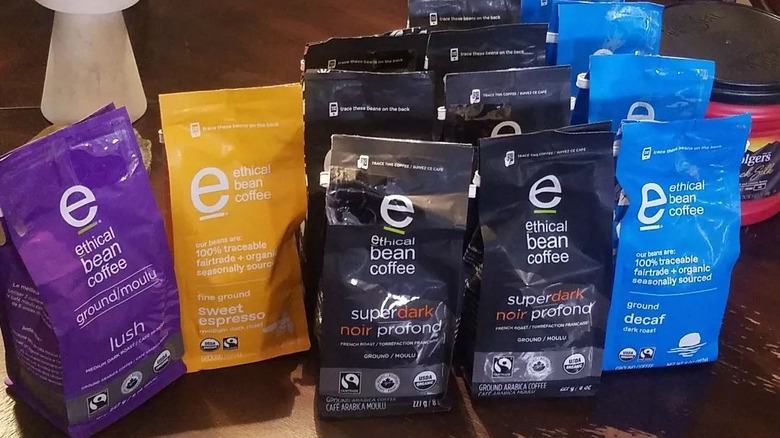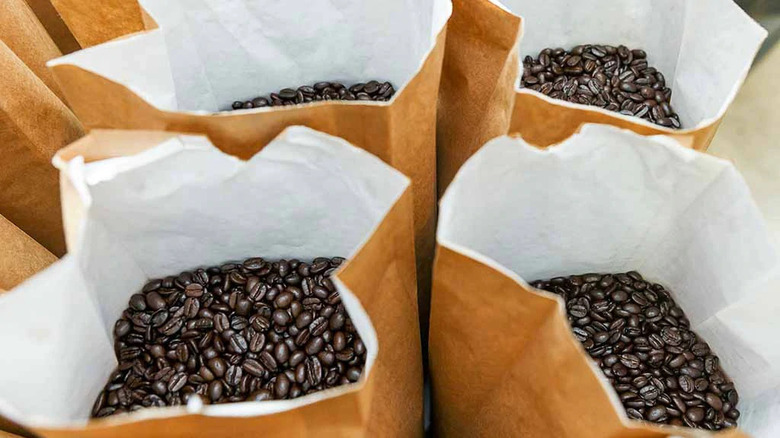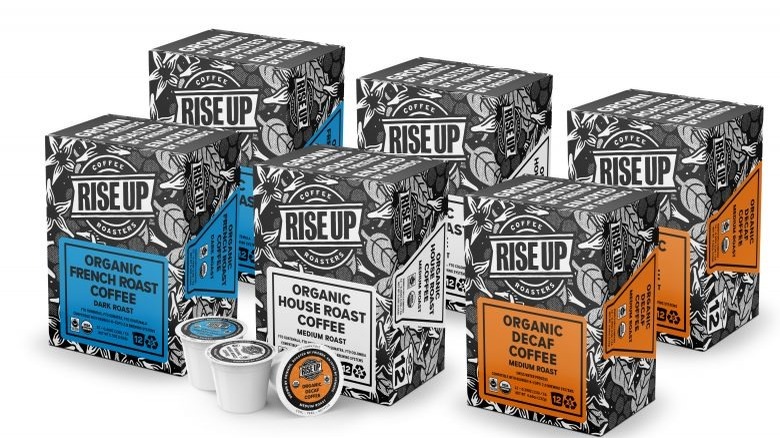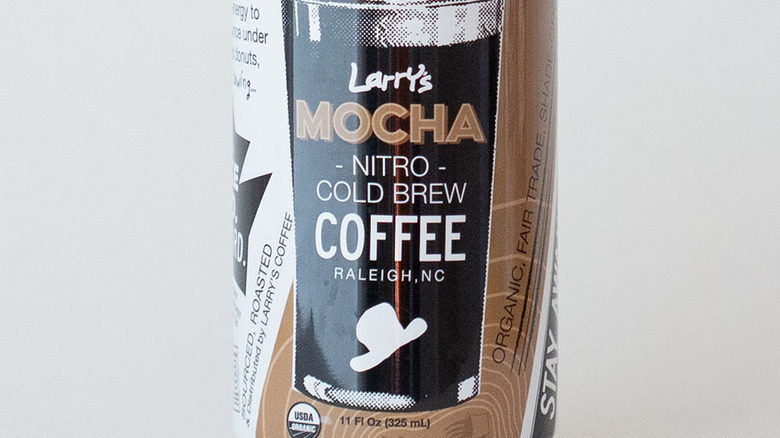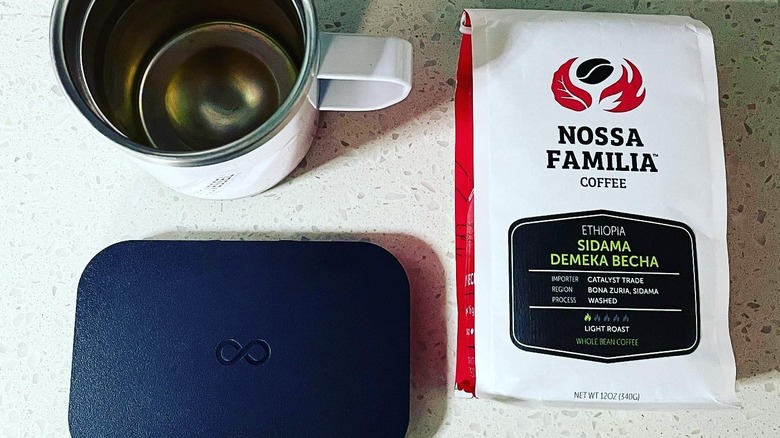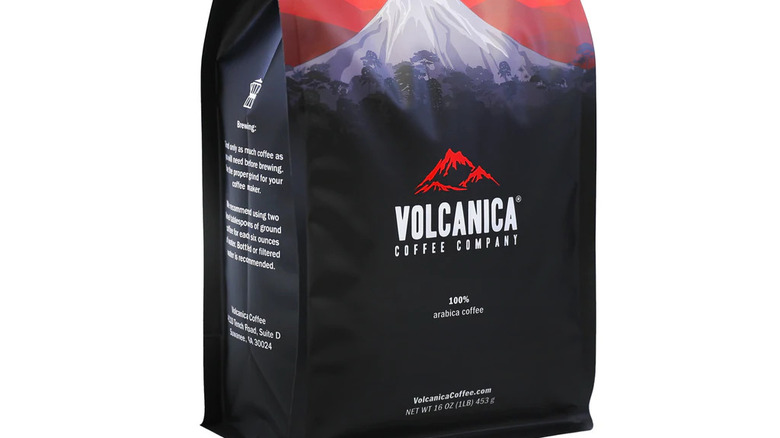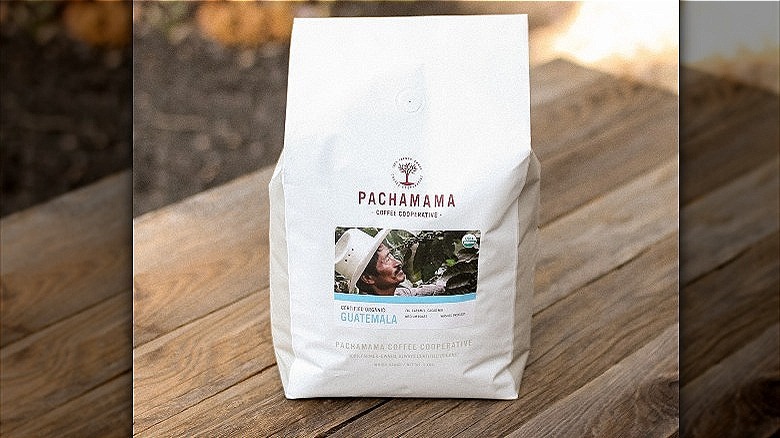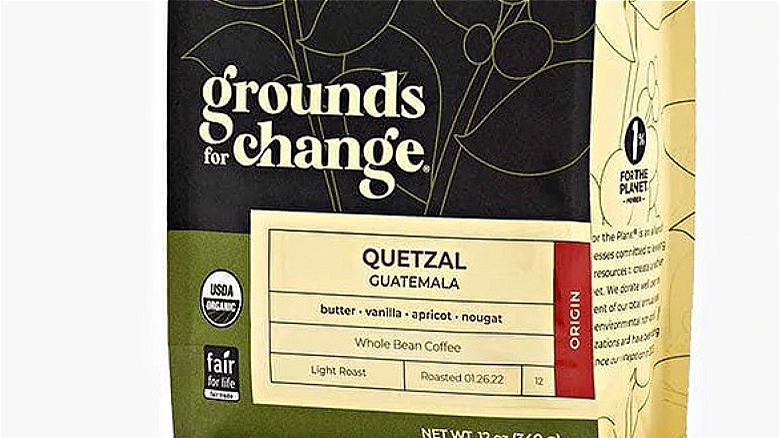The Best Fair Trade Coffee Brands You Can Buy
The fair trade movement is a global initiative that's helping consumers to be more aware of where the items they buy come from, how they are produced, and who produces them. In order to earn the Fair Trade seal, a product has to meet strict standards. As explained by Fair Trade Certified, this includes having been produced by workers in safe working conditions and earning adequate livelihoods. They must also be produced with environmental sustainability in mind.
While many products now carry the Fair Trade seal, one item in particular that consumers may want to look for the seal on is coffee. According to Carto, 60% of the world's coffee is produced by smallholder farmers. Of those farmers, a majority live in poverty.
With more than 50% of us starting our day with a cup of coffee, purchasing Fair Trade Certified coffee is a great way for consumers to support small coffee farmers while still enjoying a delicious cup o' Joe. Let's take a look at the best fair trade coffee brands you can buy today.
Equal Exchange
Equal Exchange sells a variety of fairly traded goods, including coffee, tea, chocolate, nuts, and more. Per the company site, the U.S. still had an embargo against Nicaragua when founders Rink Dickinson, Jonathan Rosenthal, and Micahel Rozyne started importing fairly traded coffee from the country in 1986. While they couldn't import the beans directly from Nicaragua, they were permitted to import the beans after they were roasted in another country. So, that's what they did. As their site explains, "Importing coffee beans from Nicaragua would demonstrate solidarity with the fledgling people's movement and would challenge U.S. trade policies."
Today, the co-op-owned company continues to support small farmers around the globe, and they've stuck to the mission statement they established in the '80s. As a rep for Equal Exchange told Willy Street Co-op in 2015, "Fair trade, when it's practiced well, provides better prices, access to information, and opportunities for collaboration. Those are very important first steps to economic sustainability for a small farmer."
You can find their coffee in grocery stores across the country, as well as online. They offer a variety of whole bean and ground coffees, ranging from their popular French Roast to special editions like their Organic Ray of Light, a part of their Women in Coffee Series. They even offer varieties that are organic and kosher, as well as single-serve cups and pillow packs for use in Keurigs or commercial coffee makers.
Lifeboost
Lifeboost is on a mission to not only make you feel good about your coffee purchase but also to ensure that your purchase helps you feel good, too. In addition to being fair trade, their coffee is also single-origin, free of toxins, non-GMO, and low-acid. In addition to supporting small farmers, they also encourage shade-grown methods. While this growing method produces smaller yields, it's a sustainable way to grow coffee. On top of that, as Smithsonian's National Zoo & Conservation Biology Institute points out, this approach preserves trees and protects birds and other animal life.
Lifeboost starts with sourcing fully mature beans from small farms. Next, they roast that coffee in small batches, making sure not to blend the different types of beans. A third party inspects the beans to make sure they are clear of any sort of bacteria, pesticides, and so on. If they pass muster, the beans are then shipped out.
The result of this process is a coffee that claims to be as healthy and delicious as possible. Despite the lengthy and complicated process, they still find the time and space to produce a wide variety of coffees. Their range includes classics like their Medium Roast to unique options like their Luxe line, which features rare and exotic coffees. You can order a single bag, or sign up for a recurring coffee subscription.
Cafedirect
Cafedirect is a UK-based coffee company that promises to go above and beyond the basic credentials required for fair trade certification. The company re-invests half of its profits into Producers Direct, a UK charity that works with coffee farmers to improve both their livelihoods and sustainability. The organization is run by farmers, allowing for a more direct influence on the ground.
Cafedirect is also the country's first coffee company to achieve B Corp certification, which means it's a for-profit company that is committed to using its profits for social impact.
While fair trade practices may have been growing in popularity in recent years, Cafedirect has been changing the way the industry sources coffee since 1991. Today, they sell a variety of small-batch, single-origin, and coffee blends, as well as teas and hot chocolate mixes. While ordering through their website is only available to residents of the UK, those in the U.S. can order their coffees through online marketplaces that deliver British goods worldwide, like BritSuperstore.
Kicking Horse Coffee
When Kicking Horse Coffee started roasting coffee out of a garage in the Canadian Rocky Mountains in 1996, they had a mission in mind. As co-founder Elana Rosenfeld told The Globe and Mail, "Making the product organic and fair trade was really a no-brainer." The company has gone on to generate a lot of positive buzz, including being named the top organic and fair trade coffee in Canada and one of the best places to work in the country.
Every coffee bean sourced by Kicking Horse Coffee is Fairtrade and organic-certified. This means that the farmers producing their coffee beans work in better conditions, that the company invests in the community's future, and that their beans are free of pesticides and full of flavor. Their coffee beans come from a number of sources depending on the time of year and the season, but most hail from Honduras, Peru, Nicaragua, and Mexico.
Kicking Horse Coffee's bags of beans and grounds feature fun and quirky names, like Grizzly Claw, Three Sisters, and, of course, Kick A**. Kick A** is sold at grocery stores across the U.S., making it one of the easier fair trade coffee brands to find.
Higher Ground
As its name suggests, Higher Ground is on a mission to bring the world fresher coffee that's sourced in a more sustainable, fair way. All of their 100% organic coffees are fair trade, and the company is dedicated to keeping it that way. As co-founder Chris Treter told Fair World Project, "We view our work as not only providing some of the highest quality coffees available on the planet but also to work toward creating positive social and environmental change both in growing communities and here at home."
One unique feature of Higher Ground is that they identify the farms that work with, providing customers with an overview of the farm, its location, and what makes it unique. They even describe the unique flavor notes and aromas of coffee beans grown at each farm. Higher Ground also takes their initiative to give back a step further; their popular blends of coffee each support a different organization dedicated to preserving our nation's waterways. For instance, proceeds from their popular River Roast Blend go to the Alabama Rivers Alliance.
While Higher Ground coffee is available at some retailers in the U.S., you can also order from their website. Choose individual bags, or sign up for a 3, 6, or 12-month subscription. Signing up for a subscription is also a great chance to learn how to brew your coffee the right way — with less grounds — to ensure it lasts until your next shipment.
Tiny Footprint Coffee
Many of the coffee brands on this list are committed to eco-friendly initiatives. But Tiny Footprint Coffee has taken that one step further. They're the (self-proclaimed) first carbon negative coffee company in the world. The brand is actually a partnership between coffee roaster Roastery 7 and nonprofit Mindo Cloudforest Foundation. The company donates money to the Ecuador-based organization, which uses that money on various forest restoration efforts. When you shop for bags of ground or whole bean coffee on their website, you can learn more about how the beans for that bag are produced, the unique flavor notes, and even about the farm where the coffee was grown.
In addition to supporting eco-friendly initiatives and supporting small farmers, Tiny Footprint Coffee is also dedicated to supporting female farmers. Since their founding, the brand has committed to sourcing from Women Coffee Producers from around the world where possible.
Ethical Bean Coffee
While visiting Guatemala, the future founders of Ethical Bean Coffee learned that many of the local coffee farmers were not compensated fairly for the work that goes into harvesting one of the country's top exports. When it came time for them to launch their own coffee company, the people behind Ethical Bean decided they would make sure every farmer they worked with was supported.
Unlike many coffee companies today, Ethical Bean Coffee, which was launched in 1999, has been a fair trade company from the very beginning. In addition to supporting farmers with fair wages and encouraging sustainable farming methods, the company also invests in renewable energy as they work to reduce their carbon footprint. Today, all of their coffee is also 100% organic.
A Canada-based company, Ethical Bean Coffee has a variety of flavors to choose from, as well as compostable coffee pods for use in Keurigs and other single serve coffee machines. As co-founder Lloyd Bernhardt told Specialty Food, "Our new pods provide a better solution for single serve coffee drinkers who appreciate great tasting coffee and are concerned about the environment." The company also offers a coffee subscription program so you never have to worry about running out of your java fix.
Cafe Mam
While some fair trade coffee brands source their coffee beans from throughout South America and even elsewhere around the world, Café Mam has a more narrow focus: the highlands of Chiapas, Mexico. Here, indigenous Maya farmers produce shade-grown, organic coffee beans, in exchange for fair living wages. Every purchase from Café Mam also helps the company to give back to the growers' communities through child welfare programs, education, and more. Additional proceeds go to other nonprofits organizations, like the Northwest Coalition for Alternatives to Pesticides, the Aprovecho Research Institute, Cascadia Wildlands, Center for a New American Dream.
If you happen to be in the Western United States, there's a chance you'll find Café Mam in a grocery store or coffee shop near you. You can also order freshly roasted beans from the Oregon-based company's online. Oh, and as Café Mam noted on Instagram, Oregon State University is a loyal customer that appreciates their approach to the java industry; in 2019, the institution ordered over 15,000 pounds of coffee to serve on the campus.
Rise Up Coffee
Rise Up Coffee is different from most of the brands on this list. The company didn't start out roasting their own coffee. Instead, the idea seed was planted in a mobile coffee trailer run by Tim Cureton and Abby West. Before they began roasting beans and selling them in brick and mortar shops, the two served piping hot java out of a trailer to the denizens of their small Maryland town.
The company got into the small-batch roaster game in 2005, and since then, Rise Up Coffee has opened multiple cafes, and also sells their fair trade, organic coffee online and wholesale. Each batch is roasted by an artisan coffee roaster, and flavors are never added to the coffee. What's more, as Dorchester Star noted, it was named "Best Maryland Coffee" in 2019.
Rise Up Coffee's back and white patterned bags are easy to spot, and they offer a variety of flavors, including single-origin options and exclusive bags that are only available to customers using their subscription service.
Larry's Coffee
Larry's Coffee, based in the Five Points neighborhood of Raleigh, North Carolina, is dedicated not just to Fair Trade practices, but to eco-friendliness and sustainability. Their three-building complex utilizes a number of unique features to save energy, including a giant "clearstory" that provides natural daylight to the facilities to save on electricity, state-of-the-art insulation, zone heating, and reflective flooring, to name a few. The bathrooms at their roastery are even powered by rain water tanks that can hold a whopping 2,500 gallons.
A certified B-Corporation, all of Larry's Coffee is fair trade, shade-grown, and organic. They offer a variety of whole bean and grown options, many with quirky names like the bold, dark-roasted Awake in Class or the single-origin Bolivia Aipep. They also offer espresso roasts for those who prefer different types of coffee.
One thing that sets Larry's Coffee apart from other fair trade brands on this list is their nitro and cold brew. Their nitro coffee is available in 4-packs of cans, and meets the same standards of the rest of their coffee. You can purchase their cold brew by the jug or as a concentrate to make at home. Larry's Coffee is available at a number of cafes and stores in the Raleigh/Durham area, but you can order it online for shipping throughout the U.S. and worldwide.
Nossa Família Coffee
Many fair trade coffee companies in the U.S. and Canada were founded by citizens eager to help farmers in South America and Latin America. But this next brand was actually started by a native of one of the same countries where so much of the coffee we consume is grown. Augusto Carneiro's family has been growing coffee beans in Brazil since the late 1800s. After moving to Portland, Oregon, he decided to take his family's coffee with him, and Nossa Familia Coffee was born.
When the company first started, all of its coffee beans were shipped directly to Carneiro's family farms in Brazil. Today, their sourcing has expanded, but their mission has not; they continue to bring exceptional farm-direct coffee to the U.S., while supporting small farmers. As he shared on the "Faces of Marketing" podcast, "[P]art of Nossa Familia, it's like I want to bring everybody to Brazil and to Guatemala and to these other places that we buy coffee from for people to experience that."
In addition to being fair trade and promoting sustainable, eco-friendly growing and roasting practices, the company also gives back, donating 50 cents for each bag sold to various causes. For instance, their "Full Cycle" blend, a homage to Carneiro's — and Portland's — love of cycling, benefits organizations that are working to build more accessible, healthier communities through biking.
Volcanica
While only a small number of Volcanica's 180 coffee varieties are fair trade, those 18 varieties deserve a spot on this list. While many companies dedicated to fair trade practices are smaller and may be harder to find in grocery stores, Volcanica's coffee is more widely available. And their popular fair trade roasts are a great option for consumers looking to make a more responsible choice for their morning cup of energy.
Even though many of their coffees aren't fair trade, this brand does work directly with local coffee farms and cooperatives to source all of their beans. Interestingly, some of the company's beans are grown and harvested on mountains and volcanoes because, as co-founder Maurice Contreras told Forbes, "The combination of the fertile volcanic soil, high elevation, cool climate, and moisture from the clouds nourish the coffee plants which produces a superior coffee bean."
Part of every purchase made via Volcanica's website gives back to the nonprofit charity:water. This organization is on a mission to provide safe, clean drinking water to every single person on the planet. The donations that they receive go towards initiatives like building wells and rain water harvesting infrastructure.
Pachamama Coffee
Another Fair Trade brand with a unique origin story is Pachamama Coffee. Farmers based in Peru, Guatemala, and Nicaragua created the company to grow and roast beans themselves rather than sell to roasters for a fraction of what they could be earning. After roasting their first few batches, the cooperative began selling to independent groceries in the U.S., quickly gained a footing in the market, and started roasting in Sacramento. Today, you can still find Pachamama's offerings in a number of markets in California, as well as at their cafes in Northern California.
They also offer a direct-to-consumer subscription service, called Coffee C.S.A. You can choose from single-origin or blends, and every bag is not only fair trade, but also shade-grown and certified organic. Launched in 2010, their Traceable Coffee platform, funded by the World Bank, allows consumers to not only see where their coffee comes from, but also enables them to "Tip the Farmer" if they enjoyed their coffee.
Their efforts have not gone unnoticed. When the Specialty Coffee Association named the Pachamama Coffee Collective the winner of the Sustainability Award Business Model Category, president and co-founder Merling Preza said, "At Pachamama we are constantly working for equity in all aspects: equitable distribution, women's participation, fair prices for our producers, and fair salaries."
Grounds for Change
As the name suggests, Grounds for Change is out to change the industry in more ways than one. Besides being fair trade, all of their coffee also meets strict organic certification standards. They use 100% renewable energy to roast and package their beans, and offset all CO2 emission created throughout the process, from growing the coffee to roasting to packaging, and even the CO2 produced by customers to heat water to brew their coffee. And if their sustainable initiatives weren't enough, Grounds for Change also donates over 1% of their gross annual sales to a variety of organizations dedicated to social and environmental change. As co-founder Kelsey Marshall told The Bard CEP Eco Reader, "Grounds for Change is always on the lookout for new [ways of] making the coffee supply chain more equitable and sustainable."
Grounds for Change is family-owned and operated, and located in Seattle, Washington. They ship their ground and whole bean, and the company offers both single-origin coffees and blends. For light coffee lovers, the Seabrook Blend is a popular choice, and features flavors of butter toffee, green apple, and roasted nuts.
